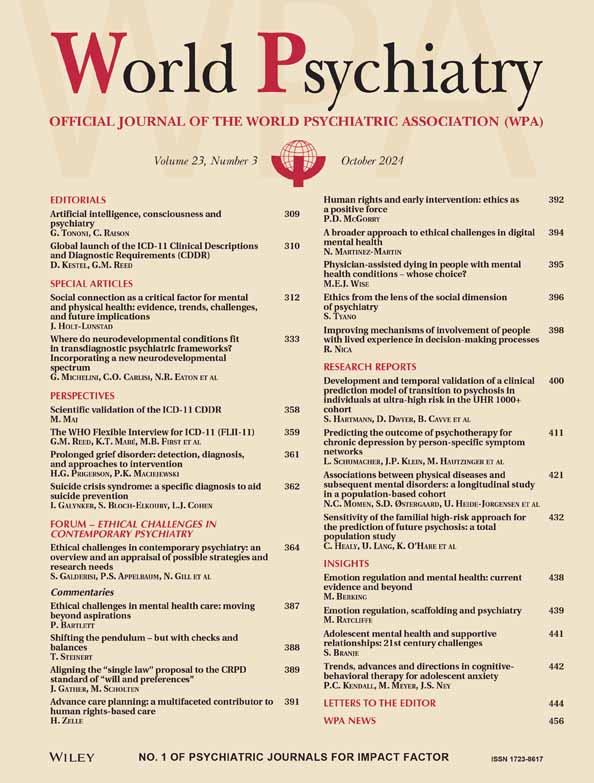The contribution of the WPA to the development of the ICD-11 CDDR
The WPA has been actively supporting the World Health Organization (WHO) in the development and scientific validation of the Clinical Descriptions and Diagnostic Requirements for ICD-11 Mental, Behavioural and Neurodevelopmental Disorders (CDDR).
Several WPA officers and experts served as chairpersons or members of the ICD-11 Working Groups that produced the drafts of the various sections of the CDDR. The chairpersons included W. Gaebel (Working Group on Psychotic Disorders), M. Maj (Working Group on Mood and Anxiety Disorders), P. Tyrer (Working Group on Personality Disorders), L. Salvador-Carulla (Working Group on Intellectual Disabilities), O. Gureje (Working Group on Somatic Distress and Dissociative Disorders) and D. Stein (Working Group on Obsessive-Compulsive and Related Disorders). Prof. M. Maj has represented the WPA in the ICD-11 International Advisory Board.
WPA Member Societies have participated in the WPA/WHO Global Survey of Psychiatrists’ Attitudes Towards Mental Disorders Classification, whose results have significantly informed the process of development of the ICD-11 CDDR. The survey involved 4,887 psychiatrists from 44 countries, representing the largest and most broadly international survey ever conducted of psychiatrists’ attitudes towards the classification of mental disorders. Through the survey, psychiatrists provided strong endorsement of a focus on clinical utility, which was indeed the main objective of the process of development of the CDDR. More than two thirds of the participants indicated that they would prefer a system of flexible guidance allowing for cultural variation and clinical judgement, as opposed to a system based on strict operational criteria, a preference which has been actually reflected in the structure of the CDDR.
Several WPA Member Societies and experts have been involved in the CDDR field trials, including the so-called formative field studies (aimed to guide decisions about the basic structure and content of the ICD-11 by exploring clinicians’ conceptualization of the interrelationships among categories of mental disorders); the Internet-based field studies (which used vignette methodologies to examine clinical decision-making in relationship to the proposed CDDR); and the clinic-based field studies (conducted to assess the reliability and clinical utility of the CDDR with real patients). The results of the largest clinic-based CDDR field trial – conducted among 1,806 patients in 13 countries, and focusing on schizophrenia and other primary psychotic disorders, mood disorders, anxiety and fear-related disorders, and disorders specifically associated with stress – have been published in World Psychiatry, the official WPA journal.
World Psychiatry has also been one of the main channels through which WPA Member Societies and the international psychiatric community have been informed about the development of the ICD-11 CDDR. In particular, the journal has hosted some of the main papers summarizing the philosophy of the entire process and the structure of the diagnostic system, and many articles dealing with specific sections of the classification, as well as individual papers or forums on general topics of classification in psychiatry. Several examples can be found in recent issues of the journal1-13. All these contributions are freely downloadable from the WPA website (www.wpanet.org).
Educational courses focusing on various sections of the ICD-11 chapter on mental, behavioural and neurodevelopmental disorders have been held in connection with several WPA meetings, including the 18th, 19th and 20th World Congresses of Psychiatry (Mexico City, Mexico, September 27-30, 2018; Lisbon, Portugal, August 21-24, 2019; Bangkok, Thailand, March 10-13, 2021), and the Regional Congresses on “Interdisciplinary Understanding of Co-morbidity in Psychiatry: from Science to Integrated Care” (St. Petersburg, Russia, May 16-18, 2021) and “Psychopathology in Periods of Transition” (Kyiv, Ukraine, July 7-9, 2021). These courses have represented a unique opportunity for psychiatrists from many countries to directly familiarize with the CDDR and exercise in their application.
A comprehensive online 20-hr training course in the use of the CDDR has been organized by the Naples WHO Collaborating Centre on Research and Training in Mental Health and the European Psychiatric Association from 9 to 30 April, 2021. The course has been coordinated by G.M. Reed and M. Maj, and has covered all the main sections of the CDDR. W. Gaebel, M. Cloitre, M. Maj, C.S. Kogan, P. Monteleone, M. Swales, J.B. Saunders and N.A. Fineberg composed the Faculty. The live course has been attended by 120 psychiatrists, selected from almost 500 applicants, representing 78 different countries. A further group of 250 psychiatrists have had access to the course on demand. A training course co-organized by the WPA and the Global Mental Health Academy, with a structure similar to the course organized by the Naples WHO Collaborating Centre and the European Psychiatric Association, but with access also to psychologists and primary care practitioners, took place online from 8 to 29 November, 2021.
A number of lectures and symposia on various issues related to the ICD-11 CDDR have been held at several World Congresses of Psychiatry. In particular, at the 19th World Congress of Psychiatry, held in Lisbon in August 2019, a plenary session dealt with the implementation of the ICD-11. G. Reed and M. Maj, who chaired the session, summarized some lessons that should be learned from the implementation of previously developed classification systems.
A WHO International Advisory Group on Training and Implementation of the ICD-11 CDDR has been established to develop and evaluate educational, training and implementation processes related to the CDDR in various countries. WPA former officers who contributed to the development of the CDDR – such as M. Maj, W. Gaebel and D. Stein – are members of this Advisory Group.
The strong collaboration between the WHO and various WPA components in all the steps of the development and testing of the ICD-11 CDDR is now expected to continue in the phase of implementation of the diagnostic system at the international level.




